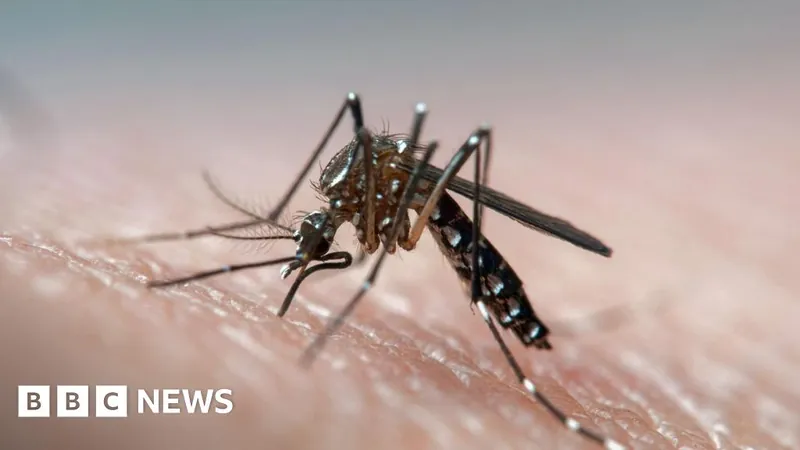
Revolutionary Breakthrough: Scientists Render Male Mosquitoes Deaf in a Battle Against Dengue
2024-11-05
Author: Amelia
Introduction
In a groundbreaking twist in the fight against mosquito-borne diseases such as dengue, yellow fever, and Zika, scientists are employing an unorthodox but clever strategy: making male mosquitoes deaf. This innovative approach is designed to disrupt their ability to mate, ultimately leading to a significant reduction in mosquito populations.
Mosquito Courtship Mechanism
Mosquito courtship is a complex aerial dance where males rely heavily on their auditory senses to locate females. By honing in on the distinct wingbeats of female mosquitoes, male insects navigate the skies in search of a mate. However, researchers have discovered a way to interfere with this process by genetically modifying the male mosquitoes to alter a specific genetic pathway that governs their hearing.
Experiment Findings
In experiments conducted by a team from the University of California, Santa Barbara, the male mosquitoes were modified to disrupt their auditory ability. Remarkably, these genetically altered insects could not physically connect with females, even after being housed together in a cage for three days. This failure to mate has significant implications for controlling mosquito populations, particularly since it is the female mosquitoes that transmit diseases to humans.
Focus on Aedes Aegypti
The focus of this research was on the Aedes aegypti species—the primary vector for viral infections that affect nearly 400 million people worldwide each year. The scientists meticulously studied the mating habits of these mosquitoes, which typically involve a courtship flight lasting anywhere from a few seconds to just under a minute. By pinpointing the role of a protein called trpVa, which is vital for sound perception, the researchers successfully engineered mosquitoes that demonstrated no response to the sounds made by potential mates.
Implications of Genetic Manipulation
In stark contrast, wild-type male mosquitoes were found to copulate frequently, managing to fertilize the vast majority of females in the same environment. The research team found the results of their genetic manipulation to be strikingly clear—the altered males were completely incapable of mating due to their deafness.
Expert Opinions
Dr. Joerg Albert, a noted expert on mosquito reproductive behavior from the University of Oldenburg in Germany, commented on the significance of this study, stating that targeting the sense of sound represents a promising avenue for mosquito control. However, he also emphasized the importance of further investigation to ensure the safety and effectiveness of this approach.
Considerations and Future Directions
In addition to genetic modification, another method researchers are exploring is the release of sterile male mosquitoes in regions plagued by mosquito-borne diseases. While mosquitoes pose a significant health risk due to their disease-carrying capabilities, it is crucial to remember that they also play an essential role in ecosystems, serving as food for various species, including fish, birds, bats, and frogs, as well as acting as important pollinators.
Conclusion
As scientists continue their quest to understand and manage mosquito populations, this novel tactic offers hope for more effective strategies to reduce the spread of deadly diseases and brings us one step closer to minimizing the impact of these pests on public health. Stay tuned for what might be the next wave in the battle against dengue and other mosquito-mediated illnesses!









 Brasil (PT)
Brasil (PT)
 Canada (EN)
Canada (EN)
 Chile (ES)
Chile (ES)
 España (ES)
España (ES)
 France (FR)
France (FR)
 Hong Kong (EN)
Hong Kong (EN)
 Italia (IT)
Italia (IT)
 日本 (JA)
日本 (JA)
 Magyarország (HU)
Magyarország (HU)
 Norge (NO)
Norge (NO)
 Polska (PL)
Polska (PL)
 Schweiz (DE)
Schweiz (DE)
 Singapore (EN)
Singapore (EN)
 Sverige (SV)
Sverige (SV)
 Suomi (FI)
Suomi (FI)
 Türkiye (TR)
Türkiye (TR)